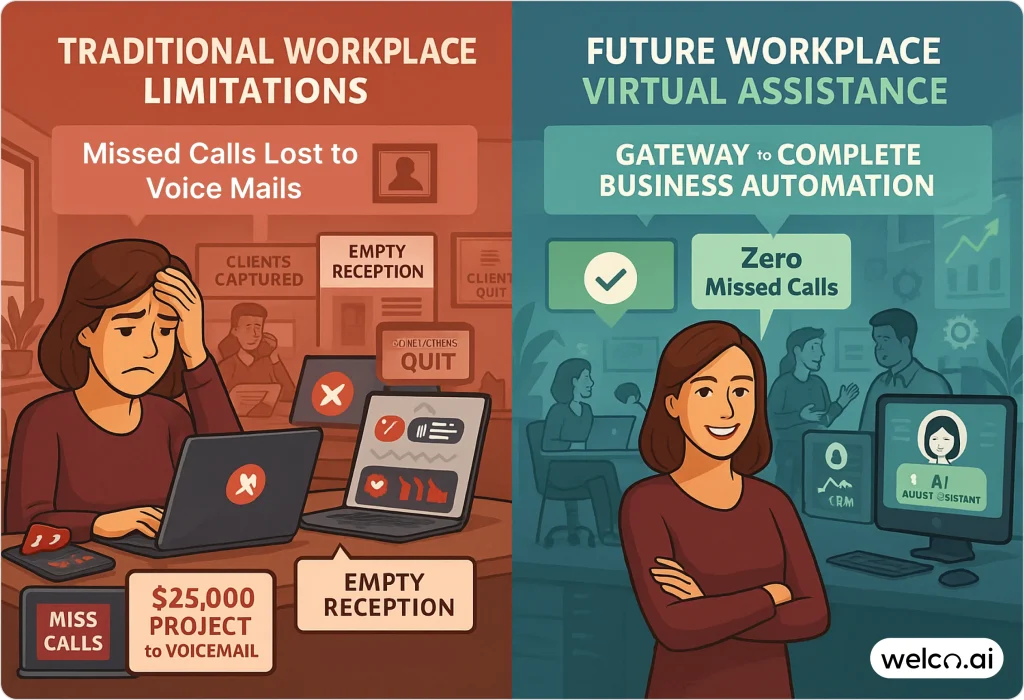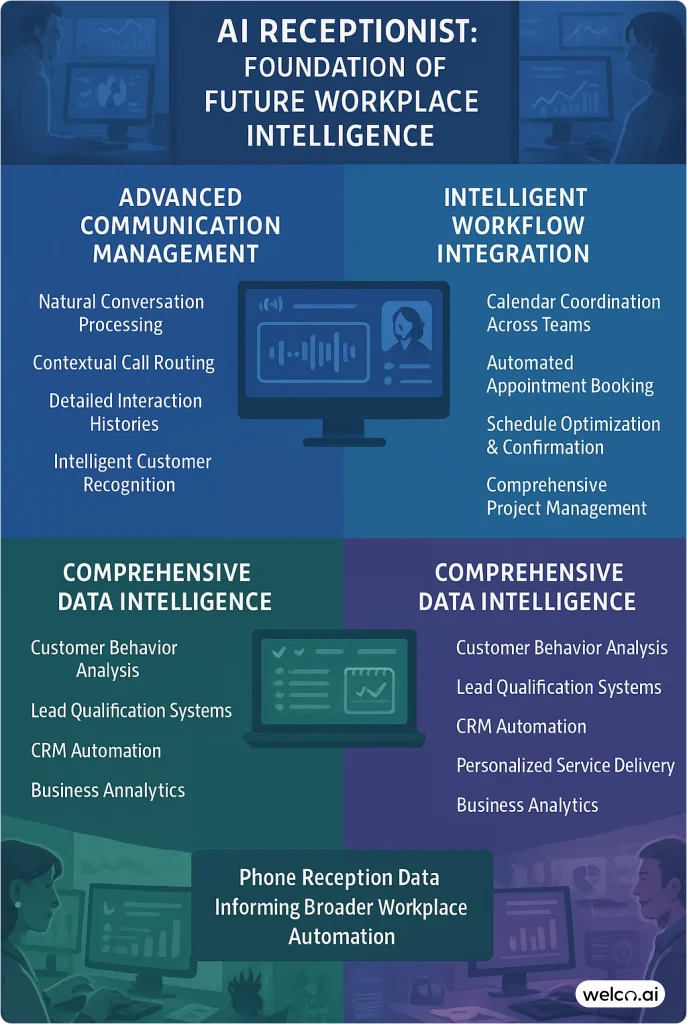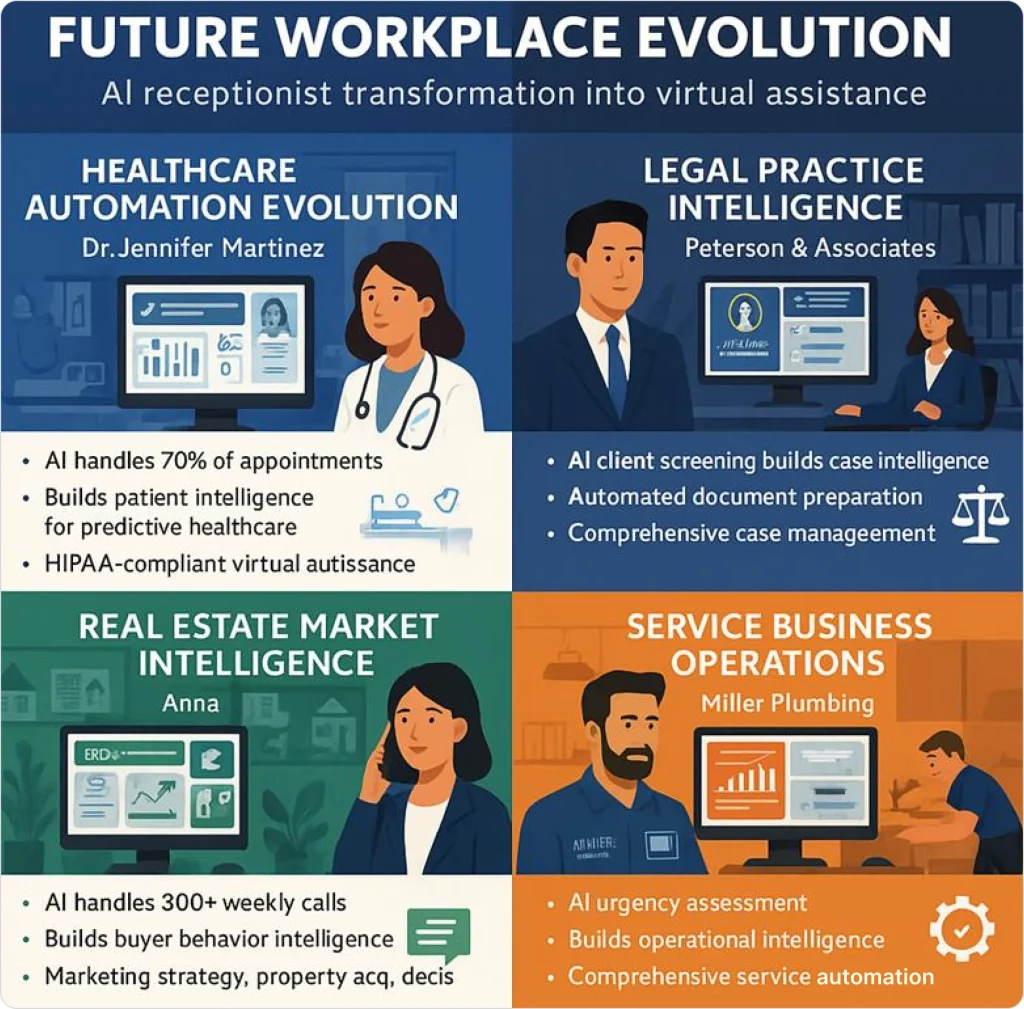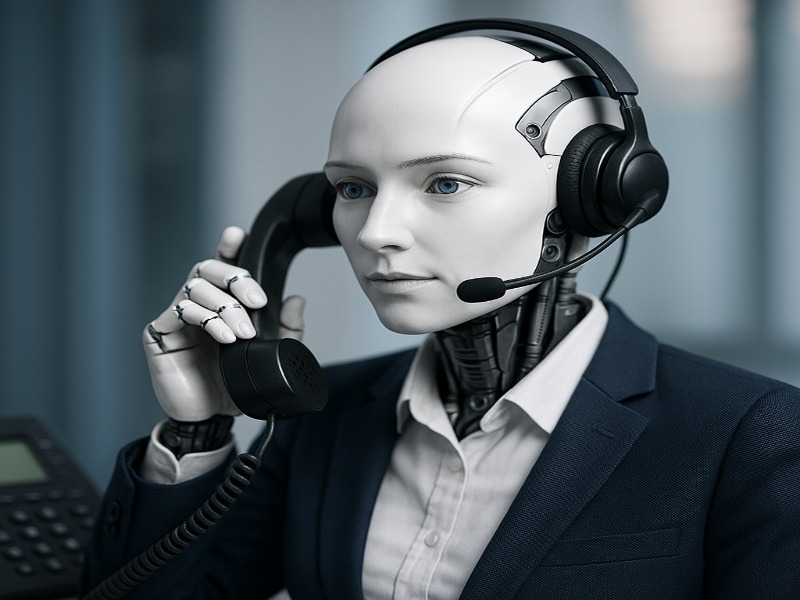The Dawn of Intelligent Workplace Automation
Last month, Sarah, who runs a 12-person digital marketing agency, experienced a glimpse of the future workplace. Her receptionist quit with minimal notice during their busiest campaign season, but instead of scrambling for a replacement, she deployed something revolutionary: an AI virtual assistant that would become the cornerstone of her company’s digital transformation.
The breaking point came when a major prospect called at 6 PM about a $25,000 project, got voicemail, and signed with a competitor the next day. But this setback became the catalyst for embracing future workplace virtual assistance.
Instead of rushing to hire a replacement, Sarah implemented an AI virtual receptionist that afternoon—the first piece of what would become a comprehensive workplace automation ecosystem. Six months later, she reports zero missed calls, significantly reduced operational stress, and a clear roadmap for expanding AI assistance across her entire business operation.

This scenario illustrates the broader transformation happening across industries as businesses discover that AI phone receptionists aren’t just communication tools—they’re the gateway to comprehensive future workplace virtual assistance that will redefine how organizations operate.
This transformation represents the beginning of a larger shift as businesses discover that AI phone answering services are the building blocks of comprehensive workplace digital assistance. The evolution of business reception has shifted from human-only models to intelligent systems that serve as the infrastructure for broader workplace automation, maintaining professional standards while offering unprecedented availability and scalability.
AI receptionists are proving to be the ideal entry point for future workplace virtual assistance because they address immediate business needs while building the framework for more advanced automation. As these systems learn your business patterns, customer preferences, and operational workflows, they create the data groundwork that powers broader workplace intelligence systems.
The Foundation of Future Workplace Intelligence
Today’s AI phone receptionists represent far more than automated answering systems—they’re the building blocks of comprehensive workplace virtual assistance. Thanks to emerging voice AI technology trends, these systems establish the groundwork for broader workplace automation by handling natural conversations while learning organizational patterns.
Advanced Communication Management: Beyond answering with your company greeting, these systems understand complex requests, route calls with contextual intelligence, and maintain detailed interaction histories that inform other workplace AI systems.
Intelligent Workflow Integration: Modern systems book appointments directly into calendar systems, coordinate across team schedules, send automated confirmations, and handle rescheduling while feeding data to broader workplace management platforms.
Comprehensive Data Intelligence: These systems recognize returning customers, qualify leads through strategic questioning, update CRM systems automatically, and provide personalized service while building the customer intelligence that powers future workplace automation.
The key transformation: Instead of simply managing phone calls, these systems create the data infrastructure and operational insights that enable broader workplace virtual assistance. This approach ensures professional communication while building the platform for comprehensive business automation.

Real Implementation Experience: What Actually Happens
Based on feedback from multiple business owners who’ve implemented AI answering services, here’s the honest timeline:
Week 1-2: Initial setup and training. Expect to spend time recording greetings, adjusting call flows, and monitoring performance closely. Most report setup taking 5-7 days rather than the promised 3.
Week 3-4: System begins handling routine calls effectively. You’ll likely need to fine-tune responses for industry-specific questions and pricing inquiries.
Month 2-3: Full integration achieved. Most businesses report the system handles calls better than previous human receptionists by this point. The human-AI collaboration models become seamless, with AI handling routine inquiries and smoothly transferring complex issues to human staff while building the operational intelligence that will power future workplace automation.
Sarah’s experience: “By month three, the AI knew our service packages better than some of our own staff. It started catching details in client requests that we used to miss, like budget ranges and timeline preferences. But more importantly, it was building a knowledge base about our clients that we’re now using to improve our entire service delivery.”
Common Early Challenges:
- Getting scheduling integration working properly (usually takes 2-3 weeks)
- Training the AI on specific business terminology
- Adjusting call routing for complex scenarios
- Fine-tuning lead qualification questions
Building Tomorrow’s Workplace Today: Industry Transformation Examples
The implementation of AI receptionists across different industries reveals how these systems serve as the cornerstone of comprehensive workplace virtual assistance, creating operational intelligence that transforms entire business operations.
Healthcare Practices: Pioneering Automated Patient Care
Medical offices implementing AI receptionists discover they’re building the infrastructure for comprehensive healthcare automation. Dr. Jennifer Martinez’s family practice AI system handles 70% of appointment requests while maintaining HIPAA compliance, but more importantly, it’s creating patient interaction patterns that will eventually power predictive healthcare delivery and proactive patient engagement systems.
The system learned to recognize urgent symptoms and properly route emergency calls to on-call staff, while simultaneously building a database of patient communication preferences and health concern patterns that now inform her practice’s broader healthcare optimization strategies.
Legal Firms: Establishing Intelligent Case Management
Law offices implementing AI receptionists find they’re creating the groundwork for comprehensive legal practice automation. Peterson & Associates’ AI system screens potential clients and schedules consultations, but it’s also building case intake intelligence that will eventually power automated document preparation, case timeline management, and client communication optimization.
The AI learned legal terminology within two weeks and now qualifies leads by practice area, while creating detailed client interaction profiles that inform broader practice management and case strategy development across their entire firm.
Real Estate Agencies: Creating Market Intelligence Systems
Property management companies using AI receptionists are building the platform for comprehensive real estate automation. Sunset Realty’s AI handles property inquiries and schedules viewings, but more significantly, it’s creating market intelligence about buyer preferences, property interest patterns, and seasonal trends that inform broader business strategy.
During peak season, the system managed 300+ calls weekly while simultaneously building a database of buyer behavior that now informs their marketing strategies, property acquisition decisions, and client service optimization across all business functions.
Service Businesses: Developing Operational Intelligence
HVAC, plumbing, and electrical companies implementing AI receptionists discover they’re building comprehensive service delivery automation. Miller Plumbing’s AI assesses call urgency and dispatches teams, while creating operational intelligence about service patterns, customer preferences, and resource optimization that now powers predictive maintenance and customer service enhancement across their entire operation.

Investment in Tomorrow’s Workplace Infrastructure
Understanding the true value of AI receptionists requires recognizing them as essential infrastructure for future workplace virtual assistance rather than simple cost-cutting measures. These systems represent the first phase of comprehensive workplace automation that will eventually transform entire business operations.
Traditional Reception vs. Future Workplace Intelligence Costs
Traditional Reception Costs (typical 50-employee business):
- Receptionist salary: $35,000/year
- Benefits and taxes: $8,000/year
- Training and turnover: $5,000/year
- Total: $48,000/year for 40-hour coverage with no data intelligence or automation potential
Future Workplace Virtual Assistance Platform:
- Quality AI virtual receptionist system: $6,000-$12,000/year
- Coverage: 24/7/365 with continuous learning and adaptation
- Data Intelligence: Comprehensive interaction analytics and business insights
- Missed opportunities: Essentially zero
- Automation Infrastructure: Scalable platform for broader workplace virtual assistance
Net transformation value: $36,000-$42,000 in immediate savings, plus revenue from after-hours opportunities, plus the essential infrastructure for comprehensive workplace automation worth exponentially more in long-term operational efficiency.
One agency owner reported capturing approximately $60,000 in additional business from previously missed calls, while simultaneously building customer intelligence that informed their service delivery optimization and led to an additional 25% improvement in client retention.
Leading providers of future workplace virtual assistance solutions include Smith.ai’s hybrid human-AI approach that scales into comprehensive customer service automation and serves as a pathway to enterprise-wide workplace intelligence, RingCentral’s integrated business communication platform that provides the infrastructure for complete workplace automation ecosystems, and Simple Phones’ quick-deployment system that grows into broader operational intelligence platforms. Each offers different pathways to advanced workplace automation depending on your business needs and automation goals.
Next-Generation Workplace Virtual Assistance Capabilities
Modern AI virtual receptionists offer sophisticated capabilities that serve as the foundation for comprehensive future workplace automation, going far beyond simple call answering to create intelligent workplace ecosystems.
Intelligent Communication Orchestration
Today’s systems understand caller intent through natural language processing, but they’re also building communication intelligence that will eventually power comprehensive workplace automation. When someone calls asking about “pricing for your premium package,” the AI recognizes this as a sales inquiry and routes accordingly, while simultaneously updating customer relationship intelligence that informs broader business strategy.
The context awareness extends to recognizing returning callers and building comprehensive interaction histories. If John Smith called yesterday about website design services, the AI remembers this conversation and can reference it, while contributing to broader customer intelligence that will eventually power predictive business automation and proactive customer engagement systems.
Advanced Workflow Orchestration and Resource Management
Beyond basic appointment booking, modern AI receptionists are creating the foundation for intelligent workplace ecosystems. They coordinate multi-person meetings by checking availability across team calendars, reschedule appointments while considering buffer times and travel requirements, handle recurring appointments with automatic reminders, manage waiting lists and automatically fill cancellations, and send pre-appointment preparation instructions—all while building operational intelligence about resource utilization and workflow efficiency.
Sarah’s agency AI now manages her entire team’s calendars while simultaneously creating operational insights about productivity patterns, client engagement preferences, and resource allocation that inform broader business optimization strategies. “It’s like having a personal assistant who never forgets anything and is constantly learning how to make our entire operation more efficient,” she notes.
Comprehensive Business Intelligence Integration
The most powerful AI receptionists integrate seamlessly with existing business tools while building the foundation for comprehensive workplace virtual assistance:
Advanced CRM Evolution: Beyond creating leads and updating contacts, these systems build comprehensive customer intelligence that will eventually power predictive business automation, proactive customer engagement, and strategic business development.
Intelligent Marketing Automation: These systems add prospects to email sequences and trigger follow-up campaigns, while building marketing intelligence that informs broader customer acquisition and retention strategies.
Financial Process Automation: Some systems process payments and handle billing inquiries while building financial intelligence about customer behavior, payment patterns, and revenue optimization opportunities.
Comprehensive Project Intelligence: These systems create tasks and update project statuses while building operational intelligence about workflow efficiency, resource allocation, and project success patterns that inform business-wide optimization.
Comprehensive Business Intelligence and Predictive Analytics
Advanced AI receptionists provide detailed insights that serve as the foundation for intelligent workplace systems and predictive business automation:
- Peak communication patterns and seasonal business trends that inform resource planning
- Customer behavior analysis and preference mapping that powers personalized service delivery
- Lead source intelligence and conversion optimization that informs marketing strategy
- Operational efficiency metrics and workflow optimization opportunities
- Customer satisfaction intelligence and service delivery enhancement insights
These insights help businesses optimize current operations while building the intelligence framework for comprehensive workplace automation. One consulting firm discovered through their AI analytics that 40% of calls came from a specific geographic area, leading them to open a satellite office and increase revenue by 25%, while simultaneously building market intelligence that now informs their broader business expansion strategy.
Addressing Common Concerns
“Will customers know they’re talking to AI?” Most customers care more about getting quick, professional service than whether they’re speaking to a human. In practice, fewer than 5% of callers mention it, and reactions are generally neutral to positive. Modern systems excel at voice search and business discovery, helping customers find information quickly without the usual phone tree frustrations.
“What about complex, industry-specific needs?” AI phone systems learn terminology and procedures quickly. Property management companies, law firms, healthcare practices, and dental offices report successful implementation after proper training periods. Whether you need an AI receptionist for healthcare or legal services, these systems adapt to industry-specific requirements while maintaining AI ethics in customer communication standards.
“Is this only viable for large companies?” Small to medium businesses often benefit most since every missed call has greater impact. AI receptionists help smaller companies sound as professional and available as larger enterprises, without the overhead costs.
Critical Implementation Mistakes to Avoid
Choosing Based on Price Alone: Budget systems often sound robotic and frustrate customers. Quality AI phone answering services cost more but deliver professional results that maintain your business reputation.
Insufficient Training Period: Allow 4-6 weeks for proper system training rather than expecting immediate perfection from your automated receptionist.
Poor Integration Planning: Ensure your calendar, CRM, and phone systems can integrate with your chosen AI receptionist software before implementation.
Skipping the Trial Period: Most reputable providers offer trials. Use them to test how the AI handles your actual business scenarios before committing.
Hidden Implementation Challenges
Underestimating Staff Training: While the AI learns quickly, your team needs training on when and how to take over calls. Establish clear protocols for complex situations that require human intervention.
Ignoring Call Volume Patterns: Implement during slower periods to work out issues before peak seasons. Sarah’s agency made this mistake and spent their busiest month troubleshooting instead of serving clients.
Poor Voice and Tone Selection: The AI’s voice represents your brand. Choose voices that match your company personality and test them with real customers before going live.
Inadequate Backup Planning: Always have fallback procedures when the AI system needs maintenance or experiences issues. One restaurant lost bookings for an entire evening because they hadn’t configured call forwarding during a system update.
What to Expect Realistically
Immediate Benefits: Professional call handling starts from day one, though fine-tuning continues for several weeks.
Full ROI Timeline: Most businesses see complete return on investment within 3-6 months through cost savings and additional revenue. Advanced predictive service capabilities help identify peak call times and customer patterns for better resource planning.
Ongoing Management: Once properly configured, these systems require minimal daily management but benefit from periodic optimization.
Making the Decision
AI phone systems work best for businesses that:
- Receive 20+ calls per day
- Lose opportunities to after-hours calls
- Struggle with reception consistency
- Want to reduce operational costs while improving service
- Need 24/7 AI receptionist coverage
They’re less suitable for businesses requiring highly specialized, complex phone interactions that change frequently.
The Evolution Toward Comprehensive Workplace Intelligence
The AI receptionist landscape represents the beginning of a fundamental transformation in workplace automation, with several emerging trends pointing toward comprehensive virtual assistance that will reshape how businesses operate:
Intelligent Workplace Personalization
Advanced systems now offer voice cloning capabilities and personalized interaction models, allowing businesses to create AI assistants that maintain brand consistency while providing scalable automation. This technology serves as the foundation for comprehensive workplace virtual assistance that adapts to individual business cultures and operational preferences.
Emotional Intelligence and Human-Centered Automation
Next-generation AI receptionists detect caller emotions through voice analysis and adjust responses accordingly, while building emotional intelligence databases that will eventually power comprehensive workplace automation focused on human experience optimization. If a caller sounds frustrated, the AI offers immediate human connection while learning about customer satisfaction patterns that inform broader service delivery improvement.
Predictive Business Automation
Future systems will anticipate business needs based on historical data, market conditions, and operational context. For example, if a snow storm is forecast, an HVAC company’s AI might proactively mention emergency services while simultaneously adjusting resource allocation, updating service schedules, and optimizing operational readiness across the entire business operation.
Comprehensive Communication Orchestration
AI receptionists are expanding beyond voice to handle text messages, emails, video calls, and social media interactions through unified intelligence platforms. This omnichannel approach ensures consistent customer experience while building the communication intelligence that will power comprehensive workplace virtual assistance across all business functions.
Industry-Intelligent Automation Networks
Specialized AI models trained for specific industries are emerging, offering deeper understanding of sector-specific regulations, best practices, and operational requirements. Medical practice AI receptionists now understand insurance terminology and healthcare compliance, while legal office systems comprehend case management and court procedures—creating industry-specific intelligence that will eventually power comprehensive workplace automation tailored to professional requirements.
Embracing the Future of Workplace Automation
Modern AI virtual receptionists represent the foundation of comprehensive workplace virtual assistance that will transform how businesses operate. While implementation requires patience and proper setup, the combination of immediate cost savings, improved customer service, and long-term automation infrastructure makes them essential for companies ready to embrace the future of workplace intelligence.
The key is recognizing these systems as foundational infrastructure for broader workplace automation rather than simple phone answering solutions. By choosing quality AI answering services, allowing adequate training time, and maintaining realistic expectations during the transition period, businesses build the platform for intelligent workplace systems that will provide competitive advantages for years to come.
As omnichannel integration strategies become more sophisticated and workplace automation becomes standard business infrastructure, these systems will serve as the cornerstone of intelligent workplace ecosystems that optimize every aspect of business operations. The businesses investing in this groundwork today are positioning themselves to lead their industries as workplace virtual assistance evolves from emerging technology to essential business infrastructure.
Frequently Asked Questions
How do AI receptionists evolve into comprehensive workplace virtual assistance?
AI receptionists start by handling calls but continuously learn your business patterns, customer preferences, and operational workflows. This data becomes the foundation for broader workplace automation—from predictive scheduling to customer intelligence that informs marketing strategy and resource allocation across your entire organization.
What makes AI receptionists the ideal starting point for future workplace automation?
Unlike other AI tools that serve single functions, AI receptionists interact with every aspect of your business—customers, scheduling, data management, and team coordination. This positions them perfectly to build the comprehensive business intelligence that powers advanced workplace virtual assistance systems.
How long before we see the broader workplace automation benefits?
While immediate call handling improvements happen within weeks, the workplace intelligence foundation builds over 3-6 months. Most businesses start seeing cross-functional benefits—like improved scheduling efficiency and customer insights informing business strategy—by month 6, with comprehensive workplace automation capabilities emerging over 12-18 months.
Can small businesses really access enterprise-level workplace virtual assistance?
Absolutely. Cloud-based AI receptionist platforms now make advanced workplace automation accessible to businesses of all sizes. Small companies often see faster implementation and greater impact since every process improvement affects their entire operation. The key is choosing systems designed to scale with your growth.
What happens to our existing business processes when we implement workplace virtual assistance?
Rather than replacing your processes, AI receptionists enhance and optimize them while building intelligence for future automation. Your team focuses on higher-value work while the AI handles routine tasks and creates operational insights that improve everything from customer service to resource planning and business development strategies.
